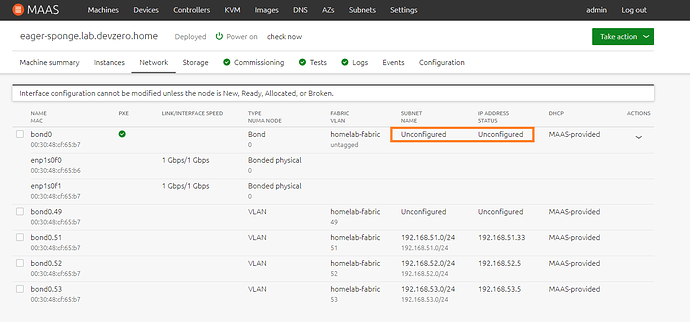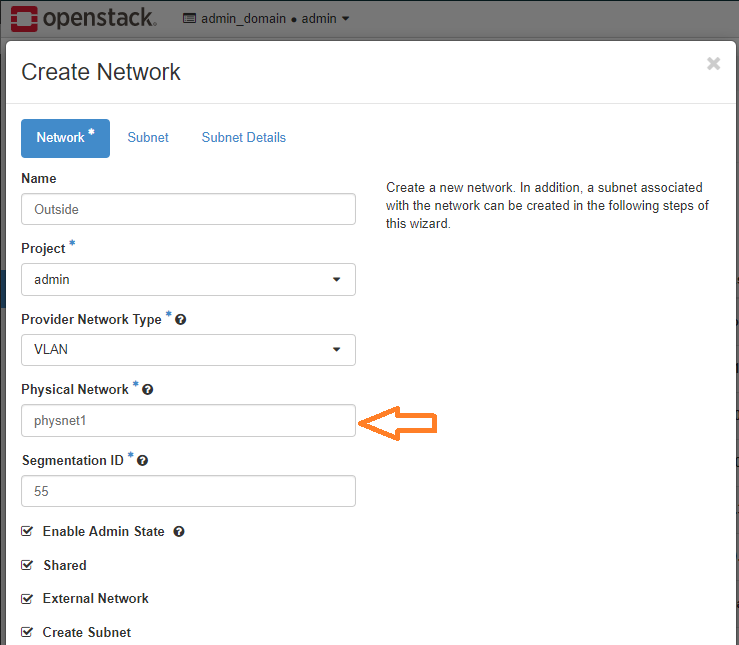Hello All,
I think I am hitting the error describe in this thread, however I am not sure. The bridges i defined for ovn-chassis never get created. When I tail the ovn-chassis log I see the following error.
unit-ovn-chassis-0: 20:36:15 INFO unit.ovn-chassis/0.juju-log ovsdb:74: Invoking reactive handler: reactive/ovn_chassis_charm_handlers.py:83:configure_ovs
unit-ovn-chassis-0: 20:36:15 DEBUG jujuc running hook tool "relation-get"
unit-ovn-chassis-0: 20:36:15 DEBUG jujuc running hook tool "relation-get"
unit-ovn-chassis-0: 20:36:15 DEBUG jujuc running hook tool "relation-list"
unit-ovn-chassis-0: 20:36:15 DEBUG jujuc running hook tool "relation-get"
unit-ovn-chassis-0: 20:36:15 DEBUG jujuc running hook tool "relation-get"
unit-ovn-chassis-0: 20:36:15 DEBUG jujuc running hook tool "relation-get"
unit-ovn-chassis-0: 20:36:15 DEBUG jujuc running hook tool "relation-get"
unit-ovn-chassis-0: 20:36:15 DEBUG jujuc running hook tool "relation-get"
unit-ovn-chassis-0: 20:36:15 DEBUG jujuc running hook tool "relation-ids"
unit-ovn-chassis-0: 20:36:15 DEBUG jujuc running hook tool "relation-get"
unit-ovn-chassis-0: 20:36:15 DEBUG jujuc running hook tool "juju-log"
unit-ovn-chassis-0: 20:36:15 INFO unit.ovn-chassis/0.juju-log ovsdb:74: CompletedProcess(args=('ovs-vsctl', '--no-wait', 'set-ssl', '/etc/ovn/key_host', '/etc/ovn/cert_host', '/etc/ovn/ovn-chassis.crt'), returncode=0, stdout='')
unit-ovn-chassis-0: 20:36:15 DEBUG jujuc running hook tool "network-get"
unit-ovn-chassis-0: 20:36:15 DEBUG jujuc running hook tool "juju-log"
unit-ovn-chassis-0: 20:36:15 ERROR unit.ovn-chassis/0.juju-log ovsdb:74: Hook error:
Traceback (most recent call last):
File "/var/lib/juju/agents/unit-ovn-chassis-0/.venv/lib/python3.8/site-packages/charms/reactive/__init__.py", line 74, in main
bus.dispatch(restricted=restricted_mode)
File "/var/lib/juju/agents/unit-ovn-chassis-0/.venv/lib/python3.8/site-packages/charms/reactive/bus.py", line 390, in dispatch
_invoke(other_handlers)
File "/var/lib/juju/agents/unit-ovn-chassis-0/.venv/lib/python3.8/site-packages/charms/reactive/bus.py", line 359, in _invoke
handler.invoke()
File "/var/lib/juju/agents/unit-ovn-chassis-0/.venv/lib/python3.8/site-packages/charms/reactive/bus.py", line 181, in invoke
self._action(*args)
File "/var/lib/juju/agents/unit-ovn-chassis-0/charm/reactive/ovn_chassis_charm_handlers.py", line 93, in configure_ovs
charm_instance.configure_ovs(','.join(ovsdb.db_sb_connection_strs))
File "lib/charms/ovn_charm.py", line 467, in configure_ovs
.format(self.get_data_ip()), '--',
File "lib/charms/ovn_charm.py", line 366, in get_data_ip
ch_core.hookenv.network_get(
File "/var/lib/juju/agents/unit-ovn-chassis-0/.venv/lib/python3.8/site-packages/charmhelpers/core/hookenv.py", line 1390, in network_get
response = subprocess.check_output(
File "/usr/lib/python3.8/subprocess.py", line 411, in check_output
return run(*popenargs, stdout=PIPE, timeout=timeout, check=True,
File "/usr/lib/python3.8/subprocess.py", line 512, in run
raise CalledProcessError(retcode, process.args,
subprocess.CalledProcessError: Command '['network-get', 'data', '--format', 'yaml']' returned non-zero exit status 1.
unit-ovn-chassis-0: 20:36:15 DEBUG unit.ovn-chassis/0.ovsdb-relation-changed Traceback (most recent call last):
unit-ovn-chassis-0: 20:36:15 DEBUG unit.ovn-chassis/0.ovsdb-relation-changed File "/var/lib/juju/agents/unit-ovn-chassis-0/charm/hooks/ovsdb-relation-changed", line 22, in <module>
unit-ovn-chassis-0: 20:36:15 DEBUG unit.ovn-chassis/0.ovsdb-relation-changed main()
unit-ovn-chassis-0: 20:36:15 DEBUG unit.ovn-chassis/0.ovsdb-relation-changed File "/var/lib/juju/agents/unit-ovn-chassis-0/.venv/lib/python3.8/site-packages/charms/reactive/__init__.py", line 74, in main
unit-ovn-chassis-0: 20:36:15 DEBUG unit.ovn-chassis/0.ovsdb-relation-changed bus.dispatch(restricted=restricted_mode)
unit-ovn-chassis-0: 20:36:15 DEBUG unit.ovn-chassis/0.ovsdb-relation-changed File "/var/lib/juju/agents/unit-ovn-chassis-0/.venv/lib/python3.8/site-packages/charms/reactive/bus.py", line 390, in dispatch
unit-ovn-chassis-0: 20:36:15 DEBUG unit.ovn-chassis/0.ovsdb-relation-changed _invoke(other_handlers)
unit-ovn-chassis-0: 20:36:15 DEBUG unit.ovn-chassis/0.ovsdb-relation-changed File "/var/lib/juju/agents/unit-ovn-chassis-0/.venv/lib/python3.8/site-packages/charms/reactive/bus.py", line 359, in _invoke
unit-ovn-chassis-0: 20:36:15 DEBUG unit.ovn-chassis/0.ovsdb-relation-changed handler.invoke()
unit-ovn-chassis-0: 20:36:15 DEBUG unit.ovn-chassis/0.ovsdb-relation-changed File "/var/lib/juju/agents/unit-ovn-chassis-0/.venv/lib/python3.8/site-packages/charms/reactive/bus.py", line 181, in invoke
unit-ovn-chassis-0: 20:36:15 DEBUG unit.ovn-chassis/0.ovsdb-relation-changed self._action(*args)
unit-ovn-chassis-0: 20:36:15 DEBUG unit.ovn-chassis/0.ovsdb-relation-changed File "/var/lib/juju/agents/unit-ovn-chassis-0/charm/reactive/ovn_chassis_charm_handlers.py", line 93, in configure_ovs
unit-ovn-chassis-0: 20:36:15 DEBUG unit.ovn-chassis/0.ovsdb-relation-changed charm_instance.configure_ovs(','.join(ovsdb.db_sb_connection_strs))
unit-ovn-chassis-0: 20:36:15 DEBUG unit.ovn-chassis/0.ovsdb-relation-changed File "lib/charms/ovn_charm.py", line 467, in configure_ovs
unit-ovn-chassis-0: 20:36:15 DEBUG unit.ovn-chassis/0.ovsdb-relation-changed .format(self.get_data_ip()), '--',
unit-ovn-chassis-0: 20:36:15 DEBUG unit.ovn-chassis/0.ovsdb-relation-changed File "lib/charms/ovn_charm.py", line 366, in get_data_ip
unit-ovn-chassis-0: 20:36:15 DEBUG unit.ovn-chassis/0.ovsdb-relation-changed ch_core.hookenv.network_get(
unit-ovn-chassis-0: 20:36:15 DEBUG unit.ovn-chassis/0.ovsdb-relation-changed File "/var/lib/juju/agents/unit-ovn-chassis-0/.venv/lib/python3.8/site-packages/charmhelpers/core/hookenv.py", line 1390, in network_get
unit-ovn-chassis-0: 20:36:15 DEBUG unit.ovn-chassis/0.ovsdb-relation-changed response = subprocess.check_output(
unit-ovn-chassis-0: 20:36:15 DEBUG unit.ovn-chassis/0.ovsdb-relation-changed File "/usr/lib/python3.8/subprocess.py", line 411, in check_output
unit-ovn-chassis-0: 20:36:15 DEBUG unit.ovn-chassis/0.ovsdb-relation-changed return run(*popenargs, stdout=PIPE, timeout=timeout, check=True,
unit-ovn-chassis-0: 20:36:15 DEBUG unit.ovn-chassis/0.ovsdb-relation-changed File "/usr/lib/python3.8/subprocess.py", line 512, in run
unit-ovn-chassis-0: 20:36:15 DEBUG unit.ovn-chassis/0.ovsdb-relation-changed raise CalledProcessError(retcode, process.args,
unit-ovn-chassis-0: 20:36:15 DEBUG unit.ovn-chassis/0.ovsdb-relation-changed subprocess.CalledProcessError: Command '['network-get', 'data', '--format', 'yaml']' returned non-zero exit status 1.
unit-ovn-chassis-0: 20:36:16 ERROR juju.worker.uniter.operation hook "ovsdb-relation-changed" (via explicit, bespoke hook script) failed: exit status 1
unit-ovn-chassis-0: 20:36:16 DEBUG juju.machinelock machine lock released for uniter (run relation-changed (74; unit: ovn-central/2) hook)
unit-ovn-chassis-0: 20:36:16 DEBUG juju.worker.uniter.operation lock released
unit-ovn-chassis-0: 20:36:16 INFO juju.worker.uniter awaiting error resolution for "relation-changed" hook
unit-ovn-chassis-0: 20:36:16 DEBUG juju.worker.uniter [AGENT-STATUS] error: hook failed: "ovsdb-relation-changed"
the relevant charm configs in my bundle are as such:
variables:
# Network Spaces
# This is Management network, unrelated to OpenStack and other applications
# OAM - Operations, Administration and Maintenance
maas: &maas maas-mgmt
# This is OpenStack Admin network; for adminURL endpoints
admin: &admin os-mgmt
# This is OpenStack Public network; for publicURL endpoints
public: &public os-ext-api
# This is OpenStack Internal network; for internalURL endpoints
internal: &internal os-int-api
# This is Shared Database network; for mysql-routers
shared-db: &shared-db os-mgmt
# This is the overlay network(s)
compute: &compute os-compute
compute-ext: &compute-ext os-cloudpublic
applications:
ovn-central:
charm: 'cs:ovn-central'
num_units: 3
series: focal
to:
- 'lxd:0'
- 'lxd:1'
- 'lxd:2'
bindings:
"": *admin
ovsdb: *shared-db
ovsdb-cms: *shared-db
ovsdb-peer: *shared-db
ovn-chassis:
charm: 'cs:ovn-chassis'
options:
bridge-interface-mappings: 'br-cloudpublic:eno2 br-compute:eno2.4001'
ovn-bridge-mappings: 'os-cloudpublic:br-cloudpublic os-compute:br-compute'
series: focal
bindings:
"": *admin
ovsdb: *shared-db
data: *compute
In MAAS, I configured each compute node’s interface as such:
I’m at a loss, any ideas?



